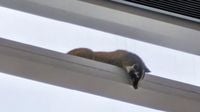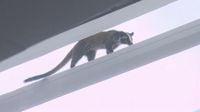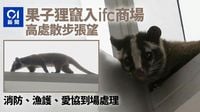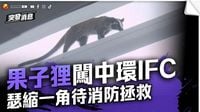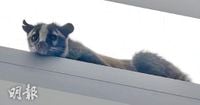On April 21, 2025, a masked palm civet was spotted in the International Finance Centre (IFC) shopping mall in Central, Hong Kong, causing a stir among shoppers and mall personnel. The unusual sighting was reported to the police at around 7 AM, leading to a swift response from emergency services.
Upon arrival, police officers confirmed that the creature was indeed a masked palm civet, a species known for its nocturnal habits and secretive nature. The civet was found perched on the glass curtain wall railing of the escalator connecting the first and second floors of the IFC Phase II mall. According to reports, the civet, measuring approximately one meter in length, was seen wandering around the area, occasionally peeking out from its elevated perch.
Firefighters, along with personnel from the Agriculture, Fisheries and Conservation Department (AFCD) and the Society for the Prevention of Cruelty to Animals (SPCA), were dispatched to the scene to manage the situation. Once on site, they set up barricades to secure the area and ensure the safety of both the civet and the public.
As the operation unfolded, the civet, seemingly startled, unexpectedly jumped from the glass curtain wall to the ground. This prompted the emergency personnel to act quickly. They surrounded the animal and successfully captured it using a net. By approximately 9:30 AM, the masked palm civet was safely contained and prepared for transport.
The captured civet was later taken to Kadoorie Farm and Botanic Garden for examination and care. This incident highlights the challenges wildlife can pose when they venture into urban environments, and the importance of having trained personnel ready to respond.
Masked palm civets are protected under Hong Kong law, specifically the Wild Animals Protection Ordinance. This legislation prohibits hunting, disturbing, or possessing these animals, with violations carrying hefty penalties, including fines up to HKD 100,000 and potential imprisonment for up to one year. The civet’s appearance in a bustling shopping mall raises questions about its habitat and the increasing encroachment of urban development on wildlife territories.
In a related note, the incident occurred during a time when Hong Kong's catering industry was experiencing a significant downturn. Tommy Cheung, chairman of the Hong Kong Catering Industry Association, reported that business had declined by as much as 30% during the Easter holiday period, largely attributed to residents traveling abroad and spending money in mainland China. The lack of mainland tourists during this period further exacerbated the situation, as Easter is not a public holiday in mainland China.
Cheung noted that over 1.8 million people had left Hong Kong in recent days, impacting the local economy and particularly the restaurant sector. Despite these challenges, certain areas, such as the West Kowloon Cultural District, have seen a surge in visitors due to events, which has helped local eateries report better business.
In a lighter turn of events, Gigi, a local celebrity known for her love of animals, shared her recent experience volunteering at the 'Lucky Dog House' near Yuen Long Kam Sheung Road. On April 19, she posted on social media about her day, where she walked dogs, bathed them, and helped clean the shelter. Gigi expressed her joy in participating in such activities, stating that it was her first time helping out in this way and encouraging others to contribute to animal welfare.
Meanwhile, as the city grapples with the implications of wildlife encounters and economic challenges, the masked palm civet incident serves as a reminder of the delicate balance between urban life and nature. The response to the civet's appearance was swift and effective, showcasing the commitment of local authorities to protect both wildlife and public safety. As Hong Kong continues to develop, the integration of wildlife conservation into urban planning becomes increasingly vital.
In recent years, there have been several notable incidents involving masked palm civets in urban settings. For instance, in August 2022, a civet entered the MTR Kennedy Town Station, and in November 2021, two civets were spotted in a law firm office in Central, causing quite a commotion. These occurrences highlight the ongoing interaction between wildlife and urban environments, raising awareness about the need for coexistence strategies.
As the city moves forward, it will be crucial for residents and authorities alike to consider how to maintain this balance. The recent civet encounter at IFC not only captivated onlookers but also sparked discussions about wildlife management and urban ecology.
In conclusion, the masked palm civet's unexpected appearance in one of Hong Kong's busiest shopping centers has drawn attention to the complexities of urban wildlife management. With proper measures and community awareness, Hong Kong can continue to thrive as a bustling metropolis while also protecting its unique wildlife.
